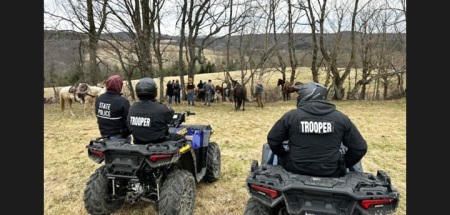Health Department Issues Rabies Alert
Published:
February 14th, 2024
By:
Sarah Genter
 The Chenango County Health Department is advising area residents to keep a distance from wildlife after a raccoon found in the Town of Norwich tested positive for rabies. Any mammal can get rabies, and is most commonly found in raccoons, skunks, bats, foxes, and rabbits, among others. (Photo by Dustin Genter of 5th Dimension Photography)
The Chenango County Health Department is advising area residents to keep a distance from wildlife after a raccoon found in the Town of Norwich tested positive for rabies. Any mammal can get rabies, and is most commonly found in raccoons, skunks, bats, foxes, and rabbits, among others. (Photo by Dustin Genter of 5th Dimension Photography)
NORWICH — The Chenango County Health Department issued a rabies alert last week after a raccoon found in the Town of Norwich tested positive for rabies.
The department said the raccoon was picked up on County Route 33 between Shumway Hill and White Store Roads, and was tested by the NYS Wadsworth Laboratory on February 5.
Residents and visitors to the area have been advised to take precautions, such as enjoying wildlife from a distance; educating children on the dangers of stray and wild animals; ensuring all dogs, cats, ferrets, and livestock are vaccinated for rabies; and reporting animals that are behaving strangely or aggressively to the Chenango County Sheriff's Department or the Chenango County Health Department.
Director of Chenango County Public Health Isaiah Sutton said the symptoms of rabies includes weight loss, appearing malnourished, paralysis, and foaming at the mouth, which is caused by an inability to swallow.
In both domestic and wild animals, he said abnormal or aggressive behavior can be a cause for concern.
"In domestic animals, if your animal acts markedly differently than you expect it to," Sutton explained. "A wild animal that will come right up to you, that’s not what you expect out of a raccoon. So that is cause for concern. If a normally passive animal becomes quite aggressive without any explanation, also cause for concern, and would bear some additional monitoring or testing."
If a pet or livestock animal is behaving strangely, owners should contact their veterinarian immediately.
Additionally, the Health Department has advised individuals not to approach, feed, pick up, or handle any stray or wild animals. They also urged residents not to kill healthy appearing animals.
Sutton said the rabies virus is only passed through saliva and nervous tissue.
"The state defines exposure as a copious amount of the infected animal’s saliva introduced into your system. So that’s a bite, a scratch, if a rabid animal were to lick an open wound. If a pet has a fight with an animal, we can't really know. But if the rabid animal bites the pet, that’s considered an exposure," he said.
In the event of an animal bite or scratch, the department recommends washing and rinsing the wound thoroughly for several minutes, applying a disinfectant, seeking medical attention, and reporting the wound to a health care provider or the Chenango County Health Department at 607-337-1673.
All dogs, cats, ferrets, and livestock should be vaccinated against rabies. Sutton said if an animal is vaccinated and exposed to rabies, the treatment is a simple booster shot. However, if the animal is not vaccinated, the only options are a strict six-month quarantine or euthanasia.
The Chenango County Health Department frequently offers free rabies vaccine clinics for pets. Keep an eye on the Chenango County Health Department Facebook page for information on upcoming clinics.
If a human is exposed to rabies, Sutton said a post-exposure treatment of three to four vaccines will be administered over the course of a few weeks. The treatment is 99.9 percent effective at preventing disease, as long as the individual is not showing symptoms of rabies.
"We like to say that it’s never too late to start [treatment] until someone becomes ill. Once symptoms onset in humans, there is no known treatment," said Sutton. "Rabies is considered a deadly virus. Once someone becomes ill, there's only a handful of success stories, and there’s not really a known medication or treatment therapy that is attributed to those successes."
Author: Sarah Genter - More From This Author
Comments






